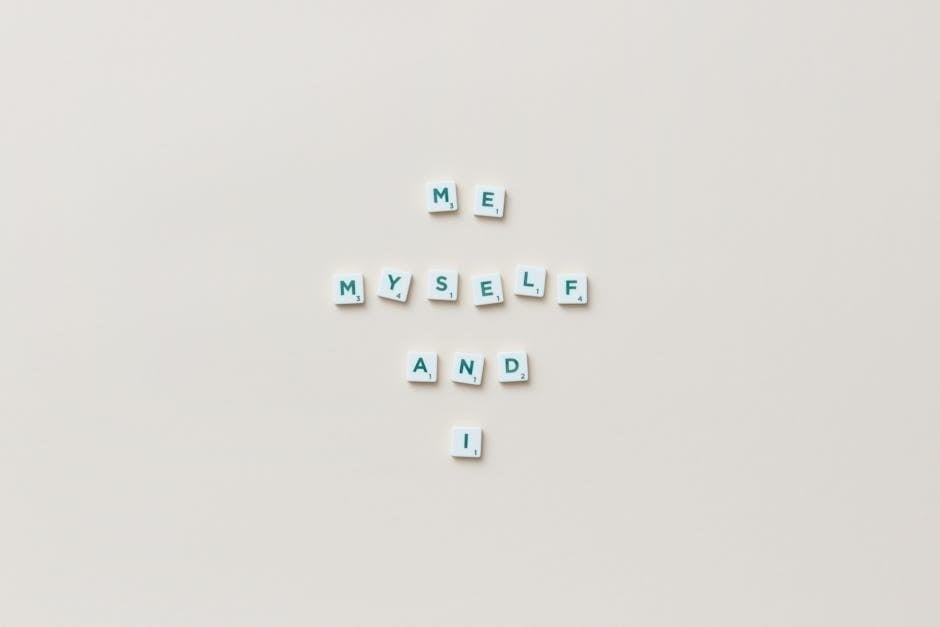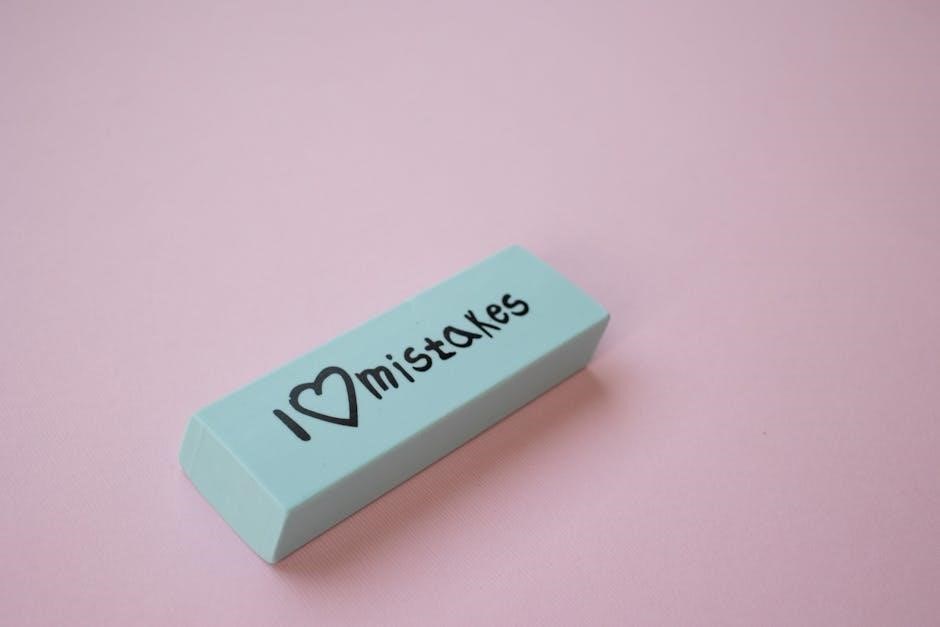mistakes were made but not by me pdf
Overview of the Book
This book by Carol Tavris and Elliot Aronson explores cognitive dissonance and self-justification, revealing why people struggle to admit mistakes, often rationalizing harmful actions to maintain self-image.
“Mistakes Were Made (But Not by Me)” delves into the human tendency to rationalize and justify errors, exploring cognitive dissonance and its impact on behavior. The book examines how individuals and groups avoid accountability, often distorting reality to maintain a positive self-image. It reveals the psychological mechanisms behind self-justification, such as memory distortion and blame-shifting, and how these behaviors affect personal relationships and societal dynamics. By blending psychological research with real-world examples, the authors provide a compelling analysis of why admitting mistakes is challenging and how it hinders growth and understanding. The book offers practical insights into overcoming these biases.
Authors: Carol Tavris and Elliot Aronson
Carol Tavris and Elliot Aronson, renowned psychologists, co-authored “Mistakes Were Made (But Not by Me),” blending their expertise in cognitive dissonance and human behavior. Tavris, a celebrated author and lecturer, specializes in the psychology of emotions and decision-making, while Aronson, a pioneer in social psychology, is known for his work on cognitive dissonance and the justification of harmful actions. Together, they provide a compelling exploration of self-justification, offering insights into how individuals and groups rationalize mistakes to maintain a positive self-image. Their collaboration results in a thought-provoking analysis of human behavior and its implications.
Key Themes: Cognitive Dissonance and Self-Justification
The book delves into cognitive dissonance, the mental discomfort arising from conflicting beliefs or actions, and how individuals justify mistakes to reduce this discomfort. Self-justification emerges as a central theme, explaining why people rationalize harmful decisions to maintain a positive self-image. Tavris and Aronson illustrate how these mechanisms prevent personal growth and perpetuate denial, highlighting the psychological strategies employed to avoid accountability. By examining these themes, the authors reveal the profound impact of self-justification on behavior, relationships, and societal dynamics, encouraging readers to confront their own tendencies toward denial and rationalization. This exploration offers a deeper understanding of human behavior and its complexities.

The Psychology of Cognitive Dissonance
Cognitive dissonance is the mental discomfort caused by conflicting beliefs or actions, driving individuals to rationalize their mistakes to restore mental balance and maintain self-consistency.
Definition and Explanation
Cognitive dissonance is a psychological concept describing the mental discomfort caused by conflicting beliefs, values, or actions. It arises when individuals hold two inconsistent thoughts or behave in ways that contradict their self-image. This discomfort motivates people to reduce the dissonance by changing their beliefs, justifying their actions, or altering their behavior. For example, someone who values honesty but lies may experience dissonance. To resolve it, they might rationalize the lie or change their belief about its wrongness. This mechanism is a key driver of self-justification, as explored in Mistakes Were Made (But Not by Me).
How Cognitive Dissonance Drives Self-Justification
Cognitive dissonance creates mental discomfort when beliefs or actions conflict. To alleviate this, individuals often engage in self-justification, rationalizing their mistakes to maintain a consistent self-image. For instance, someone who makes a poor decision may deny responsibility or blame external factors. This psychological mechanism prevents them from admitting fault, as doing so would undermine their self-perception. By justifying their actions, people restore mental balance and avoid feelings of guilt or shame. This process, as explained in Mistakes Were Made (But Not by Me), highlights how dissonance drives the human tendency to deflect accountability and preserve ego integrity.
Real-World Examples of Cognitive Dissonance
Cognitive dissonance is frequently observed in everyday life. For instance, when someone purchases an expensive car but later experiences buyer’s remorse, they may justify the decision by exaggerating the car’s benefits. Similarly, individuals who smoke despite knowing its health risks often rationalize their behavior to reduce discomfort. Historical events, such as political scandals, also illustrate dissonance, as leaders deny wrongdoing to maintain public trust. These examples demonstrate how people consistently justify their actions to align their beliefs with their behavior, avoiding guilt or shame and preserving their self-image.

The Role of Self-Justification in Mistakes
Self-justification protects self-esteem by shifting blame or rationalizing errors, preventing accountability and hindering personal growth, as individuals prioritize maintaining a positive self-image over admitting fault.
Why People Rationalize Their Errors
Individuals rationalize mistakes to maintain a positive self-image, reduce internal conflict, and avoid feelings of guilt or shame. This psychological mechanism, rooted in cognitive dissonance, helps preserve self-esteem by distorting reality and shifting blame. People often convince themselves that their actions were justified, even when evidence contradicts this belief. This self-deception prevents personal growth and accountability, fostering a cycle of denial. By understanding this tendency, one can recognize the emotional need behind such rationalizations and work toward more honest self-reflection. Acknowledging this behavior is crucial for personal development and fostering healthier relationships.
The Consequences of Self-Justification
Self-justification leads to strained relationships, as others may perceive the behavior as dishonest or stubborn. It hinders personal growth by preventing individuals from learning and improving. Over time, self-deception creates emotional distress, as maintaining false narratives requires mental effort. This cycle of denial can escalate, making it harder to admit past mistakes and fostering further justification. Ultimately, self-justification undermines trust and credibility, both in oneself and others, perpetuating a cycle of defensiveness and missed opportunities for genuine change and understanding.
How Self-Justification Affects Personal Relationships
Self-justification often strains personal relationships by fostering resentment and mistrust. When individuals refuse to acknowledge their mistakes, others may feel invalidated, leading to emotional distance. Partners, friends, and family may perceive the behavior as defensiveness or unwillingness to grow. This can escalate conflicts, as unresolved issues accumulate without accountability. Over time, repeated self-justification erodes intimacy and mutual respect, making it challenging to maintain healthy, open communication. Relationships suffer when one party consistently avoids taking responsibility, creating an imbalance that can be difficult to reconcile without a willingness to admit and learn from errors.

Understanding the Mechanisms Behind Mistake Denial
Mistake denial stems from cognitive dissonance and self-justification, where individuals distort memories and shift blame to avoid accountability, preserving their self-image while hindering personal growth and relationships.
The Psychology of Blame-Shifting
Blame-shifting is a defense mechanism where individuals transfer responsibility for their mistakes to others, often to avoid guilt or maintain a positive self-image. This behavior is deeply rooted in cognitive dissonance, as people struggle to reconcile their actions with their self-perception. By shifting blame, they reduce internal conflict and preserve their ego. For instance, a person who fails to meet a deadline might accuse others of not providing adequate support. This not only hinders personal accountability but also damages trust and collaboration in relationships, making it harder to learn from errors and grow personally or professionally.
The Role of Memory in Distorting Reality
Memory plays a significant role in distorting reality, especially when individuals confront their mistakes. People often unconsciously alter or omit details to align their recollections with a favorable self-image. This selective memory allows them to avoid the discomfort of admitting errors. For example, someone might recall a failed project as a success or blame external factors for their oversight. Over time, these distortions become ingrained, making it difficult to acknowledge the truth and learn from mistakes. This phenomenon highlights how memory can serve as a tool for self-protection rather than an accurate reflection of events.
How Social Norms Influence Denial
Social norms significantly influence denial, as individuals often avoid admitting mistakes to align with societal expectations. The fear of judgment or rejection compels people to rationalize their errors, maintaining a positive self-image. For instance, group norms can lead to collective denial, where individuals conform to avoid conflict. This tendency is reinforced when others around them also avoid accountability. As a result, social pressures perpetuate cycles of justification, hindering personal growth and fostering a culture of blame-shifting. Understanding these dynamics is crucial for breaking free from the grip of denial and embracing accountability.

Case Studies and Examples
The book examines real-life examples of self-justification, revealing how cognitive dissonance drives denial in personal and historical contexts, offering insights into human behavior.
Historical Events and Mistake Denial
Historical events, such as decisions during WWII, highlight how cognitive dissonance leads to denial. Leaders often justify harmful actions, even when evidence contradicts their decisions, to maintain a positive self-image. This phenomenon, as explored in “Mistakes Were Made (But Not by Me),” reveals how self-justification can escalate conflicts and prevent accountability. Such cases demonstrate the profound impact of psychological mechanisms on large-scale events, emphasizing the importance of recognizing and addressing these biases to foster learning and growth. The book provides a compelling analysis of how historical mistakes are rationalized, offering insights into human behavior and decision-making.
Everyday Scenarios of Self-Justification
Everyday scenarios of self-justification are abundant, from minor decisions to significant life choices. For instance, a parent might justify spanking a child by claiming it was for their own good, despite evidence showing its harm. Similarly, someone who buys an expensive car might rationalize the purchase by emphasizing its safety features, ignoring the financial strain. These behaviors illustrate how people consistently distort reality to align their actions with their self-image, avoiding guilt or shame. Such patterns, as discussed in “Mistakes Were Made (But Not by Me),” highlight the pervasive nature of self-justification in daily life, reinforcing the book’s themes of cognitive dissonance and self-deception.
Famous Personalities and Their Justifications
Famous personalities often exhibit striking examples of self-justification. For instance, Sarah Pinsker, a quantologist at Johns Hopkins University, made a groundbreaking discovery but struggled with the implications of her work. Despite the potential consequences, she justified her actions by focusing on the scientific advancement rather than the ethical dilemmas. Similarly, historical figures and public figures frequently rationalize their mistakes to maintain their reputation and public image. These cases, as explored in “Mistakes Were Made (But Not by Me),” highlight how even accomplished individuals succumb to cognitive dissonance, prioritizing self-image over accountability.

The Impact of Cognitive Biases
Famous personalities often exhibit striking examples of self-justification. For instance, Sarah Pinsker, a quantologist at Johns Hopkins University, made a groundbreaking discovery but struggled with the implications of her work. Despite the potential consequences, she justified her actions by focusing on the scientific advancement rather than the ethical dilemmas. Similarly, historical figures and public figures frequently rationalize their mistakes to maintain their reputation and public image. These cases, as explored in “Mistakes Were Made (But Not by Me),” highlight how even accomplished individuals succumb to cognitive dissonance, prioritizing self-image over accountability.
Confirmation Bias and Its Role in Mistake Denial
Confirmation bias plays a significant role in mistake denial by leading individuals to favor information that aligns with their preexisting beliefs. When people make errors, they often seek out data or interpretations that justify their decisions, ignoring contradictory evidence. This cognitive bias reinforces self-justification, making it harder to acknowledge mistakes. For instance, a person who invests in a failing project might selectively focus on positive projections while dismissing warnings, thereby avoiding accountability. This mindset, as discussed in “Mistakes Were Made (But Not by Me),” perpetuates a cycle of denial, hindering personal growth and relationships by distorting reality to maintain a favorable self-image.
The Dunning-Kruger Effect and Overconfidence
The Dunning-Kruger Effect highlights how overconfidence often leads to mistake denial. Individuals with limited knowledge or skills overestimate their abilities, failing to recognize their errors. This cognitive bias, as explored in “Mistakes Were Made (But Not by Me),” prevents people from acknowledging flaws in their judgment. Overconfidence creates a mental barrier, making it difficult to accept criticism or admit wrongdoing. This self-deception not only hinders personal growth but also damages relationships and decision-making. By ignoring their own incompetence, individuals perpetuate cycles of denial, further entrenching their mistaken beliefs and behaviors.
How Anchoring Bias Affects Decision-Making
Anchoring bias significantly influences decision-making by causing individuals to rely excessively on the first piece of information they encounter. This cognitive bias leads to irrational choices, as people overemphasize initial data, even if it’s irrelevant or outdated. For instance, in negotiations or purchases, the first offer often sets the reference point, skewing subsequent judgments. This phenomenon, discussed in “Mistakes Were Made (But Not by Me),” illustrates how mental shortcuts can distort reality, making it harder to acknowledge errors. Anchoring bias not only affects personal decisions but also perpetuates denial of mistakes in professional and social contexts.

Strategies for Overcoming Self-Justification
Key strategies include fostering self-awareness, seeking external feedback, and embracing a growth mindset. Practicing introspection and acknowledging biases can help reduce the tendency to rationalize mistakes and harmful behaviors.
Practicing Self-Awareness and Introspection
Self-awareness and introspection are crucial for recognizing and challenging self-justification. By reflecting on past decisions and behaviors, individuals can identify patterns of rationalization and cognitive dissonance. This involves acknowledging uncomfortable truths about oneself and taking responsibility for mistakes. Introspection helps break the cycle of denial by fostering a deeper understanding of motivations and emotions. Regular self-reflection, combined with a willingness to confront flaws, promotes personal growth and ethical decision-making. This practice encourages individuals to align their actions with their values, reducing the need to justify harmful or erroneous behavior.
The Importance of Feedback and External Perspectives
Feedback and external perspectives are essential for breaking the cycle of self-justification. When individuals receive constructive criticism, it challenges their rationalizations and forces them to confront their mistakes. External viewpoints provide new insights, helping to identify biases and flawed reasoning. By seeking diverse perspectives, people can gain a more objective understanding of their actions. This fosters accountability and encourages learning from errors. Feedback also promotes humility, allowing individuals to recognize when their beliefs or decisions are harmful. Ultimately, external input serves as a powerful tool to counteract cognitive dissonance and promote personal growth.
Techniques for Admitting and Learning from Mistakes
Admitting mistakes requires acknowledging discomfort and taking responsibility. Techniques include practicing self-reflection, journaling, or discussing errors with trusted individuals. Recognizing cognitive dissonance helps individuals address internal conflicts. Embracing a growth mindset fosters openness to learning. Encouraging a culture where mistakes are viewed as opportunities, not failures, promotes honesty. Teaching constructive self-talk and active listening can also aid in processing errors. These strategies help individuals move beyond denial, fostering personal and collective growth. By addressing mistakes directly, individuals can reduce defensiveness and build resilience.

The Role of Education and Awareness
Educating individuals about cognitive biases and self-justification fosters awareness, enabling them to recognize and address mistakes. Critical thinking and growth mindsets encourage learning from errors, promoting personal development.
Teaching Critical Thinking Skills
Critical thinking is essential for recognizing biases and evaluating evidence objectively. By teaching students to question assumptions and analyze arguments, educators help them identify flawed reasoning. Encouraging open discussions and debates fosters an environment where mistakes are seen as opportunities for growth. Promoting logical reasoning and evidence-based decision-making enables individuals to challenge their own beliefs and resist the urge to justify errors. These skills are vital for personal and societal progress, as they reduce the tendency to deny mistakes and promote accountability. Educators play a key role in nurturing these abilities from an early age.
Encouraging a Growth Mindset
A growth mindset, as highlighted in “Mistakes Were Made (But Not by Me),” fosters resilience and learning from errors. It emphasizes that abilities can be developed through effort and perseverance. Educators and leaders should praise effort rather than talent, encouraging individuals to view challenges as opportunities for growth. This mindset reduces the need for self-justification and promotes accountability. By embracing mistakes as part of the learning process, individuals can break free from cognitive dissonance and cultivate a culture of improvement. This approach is crucial for personal and collective development, as it shifts the focus from blame to progress.
Integrating Mistake Analysis in Learning Processes
Integrating mistake analysis into learning processes is vital for fostering a culture of accountability and growth. By examining errors, individuals can identify patterns of self-justification and cognitive dissonance. Educators should encourage open discussions about mistakes, framing them as opportunities for insight rather than failures. This approach helps learners develop critical thinking skills and reduces the tendency to rationalize poor decisions. Regular reflection on mistakes also enhances self-awareness, enabling individuals to address biases and develop more objective decision-making processes. Ultimately, this practice promotes a deeper understanding of personal and collective behaviors, leading to meaningful improvement and resilience in the face of challenges.

Societal Implications of Mistake Denial
Mistake denial perpetuates systemic issues, fostering resistance to change and reinforcing harmful norms. Collective refusal to acknowledge errors erodes trust and hinders societal progress and unity.
How Mistake Denial Affects Leadership
Leaders who deny mistakes undermine trust and credibility, fostering a culture of blame-shifting. This impedes accountability, stifles innovation, and damages team morale. When leaders avoid responsibility, they model poor behavior, discouraging transparency and growth. Mistake denial can escalate conflicts, as unresolved issues fester. Effective leadership requires owning errors, learning from them, and leading by example. Without accountability, organizations suffer from poor decision-making and lack of progress. Admitting mistakes strengthens leadership credibility and encourages a culture of honesty and improvement, essential for long-term success and employee satisfaction.
The Role of Media in Shaping Perceptions
Media significantly influences public perception by framing narratives and selectively presenting information. This can perpetuate cognitive dissonance, as people often accept media portrayals without critical scrutiny. Media’s role in shaping perceptions is crucial, as it can either promote accountability or reinforce denial. By highlighting certain viewpoints and omitting others, media can sway public opinion, often aligning with prevailing biases. This selective reporting fosters a culture where mistakes are justified or overlooked, hindering societal progress. The media’s power to shape reality underscores the need for critical consumption of information to discern truth from biased narratives. This fosters a more informed and accountable society.
Collective Denial and Its Consequences
Collective denial occurs when groups or societies refuse to acknowledge uncomfortable truths, often due to shared biases or fear of conflict. This phenomenon exacerbates mistakes by creating a culture where individuals align with the majority, avoiding accountability. Social norms and the desire for harmony perpetuate this denial, leading to stagnation and entrenched issues. The consequences are far-reaching, as collective denial hinders progress, fosters injustice, and reinforces harmful behaviors. Addressing such dynamics requires challenging societal norms and encouraging transparency, ultimately promoting a culture of accountability and growth. Collective denial underscores the need for systemic change to prevent perpetuation of errors.
Recognizing and admitting mistakes is crucial for personal growth and societal progress. This book highlights how cognitive dissonance and self-justification hinder learning, urging accountability and introspection for a better future.
Summarizing the Key Insights
The book “Mistakes Were Made (But Not by Me)” delves into the psychology of self-justification, explaining how cognitive dissonance drives individuals to rationalize their errors. It highlights the human tendency to avoid accountability, often distorting reality to maintain a positive self-image. By examining real-world examples and historical events, the authors reveal how this mindset hinders personal growth and societal progress. The key takeaway is the importance of acknowledging mistakes to foster learning, ethical decision-making, and healthier relationships. Understanding these psychological mechanisms is essential for cultivating a culture of accountability and honest self-reflection.
The Importance of Accountability
Accountability is crucial for personal and societal growth, as it enables individuals to confront mistakes and learn from them. Without accountability, self-justification perpetuates harmful behaviors, hindering progress and relationships. By taking responsibility, people can address cognitive dissonance, fostering integrity and trust. This mindset encourages honest self-reflection, leading to better decision-making and ethical actions. The book emphasizes that accountability is not about shame but about growth, urging individuals and societies to embrace it for a more just and equitable world.
Encouraging a Culture of Admission and Growth
Fostering a culture where admitting mistakes is valued over blame-shifting is essential for progress. When individuals and societies prioritize honesty and self-awareness, they create environments conducive to learning and improvement. This shift encourages open dialogue, reduces defensiveness, and promotes empathy. By normalizing mistake admission, we dismantle the barriers that cognitive dissonance erects, allowing for genuine growth and stronger relationships. Such a culture not only enhances personal development but also cultivates collective resilience and innovation, as seen in the insights from “Mistakes Were Made (But Not by Me).”

Further Reading and Resources
For deeper insights, explore books like “Mistakes Were Made (But Not by Me)”, articles on cognitive biases, and online courses on psychology and decision-making.
- Books: Works by Carol Tavris and Elliot Aronson.
- Articles: Research papers on cognitive dissonance.
- Courses: Online workshops on behavioral psychology.
Books on Cognitive Biases and Psychology
For a deeper understanding of cognitive biases, explore “Mistakes Were Made (But Not by Me)” by Carol Tavris and Elliot Aronson, which delves into self-justification and cognitive dissonance. Other notable books include “Thinking, Fast and Slow” by Daniel Kahneman, “The Psychology of Judgment and Decision Making” by Scott Plous, and “Nudge” by Richard Thaler. These works provide insights into how biases shape decisions and behaviors, offering practical strategies to overcome them.
Articles and Research Papers
Various articles and research papers explore the concepts of cognitive dissonance and self-justification discussed in “Mistakes Were Made (But Not by Me)”. These academic works delve into real-world applications of the book’s themes, such as how individuals rationalize harmful behaviors and resist changing their beliefs despite evidence. Many papers examine historical and everyday scenarios, providing insights into the psychology of mistake denial. They also discuss the societal implications of these behaviors and offer practical advice for fostering accountability. Reading these articles alongside the book enhances understanding of cognitive biases and their impact on decision-making.
Online Courses and Workshops
Online courses and workshops offer deep dives into the concepts explored in “Mistakes Were Made (But Not by Me)”, such as cognitive dissonance and self-justification. Platforms like Coursera and edX provide courses on cognitive biases, decision-making, and behavioral psychology, complementing the book’s insights. Workshops often include interactive exercises to help participants recognize and address their own biases. These resources are ideal for those seeking practical strategies to improve self-awareness and foster a culture of accountability. They also offer expert-led discussions and real-world applications of the book’s themes.
